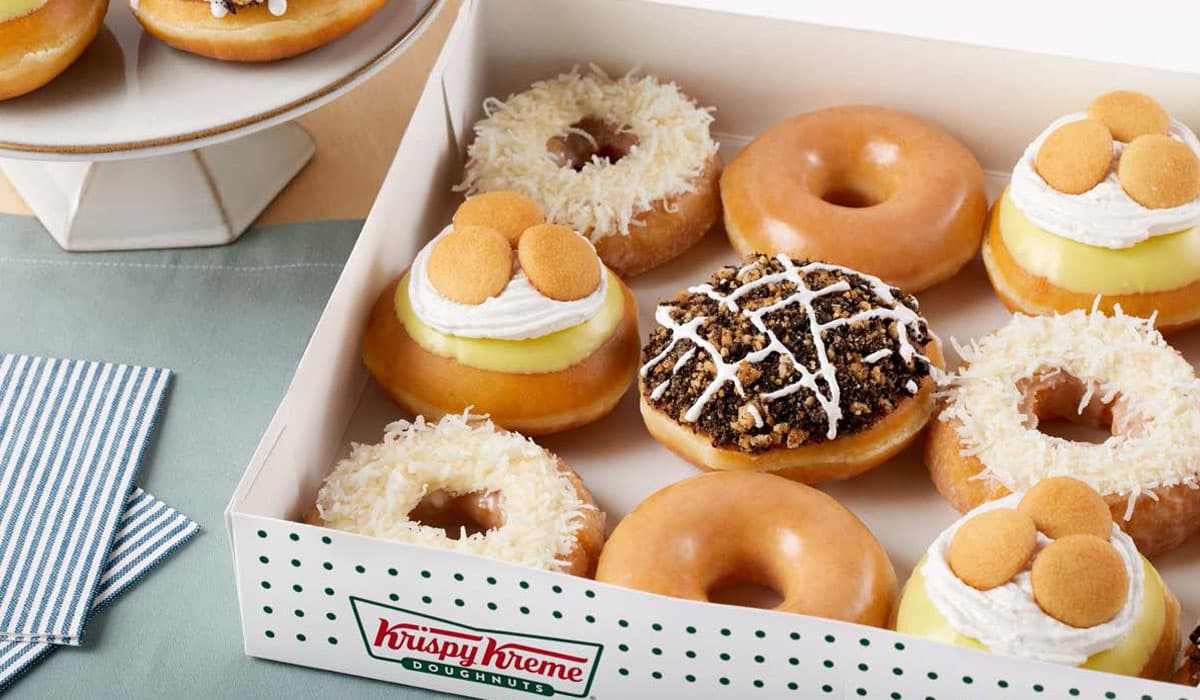Krispy Kreme filed for an IPO Tuesday, roughly a month after publicly announcing its desire to return to the stock market.
The chain intends to raise $100 million, according to the SEC filing. The number of shares and the price range for the proposed offering haven’t been determined yet, and the IPO is expected to occur after the SEC completes its review process. Krispy Kreme will be listed on the Nasdaq as “DNUT.” The company will use net proceeds from the offering to repay outstanding debt and for general corporate purposes.
Krispy Kreme earned net revenue of $1.1 billion in 2020—the highest sales level in history—and swung a net loss of $64.3 million, compared to $959.4 million in net revenue and a net loss of $37.4 million in 2019. In its most recent quarter, the company earned $321.8 million in net revenue compared to $261 million last year, and a net loss of $3 million compared to $11 million in the year-ago period. As of April 4, Krispy Kreme has 1,515 stores and 7,371 Delivered Fresh Daily locations across the globe.
“Our strategy is built on our belief that almost all consumers desire an occasional indulgence, and that when they indulge, they want a high quality, emotionally differentiated experience. We believe this desire, especially one which is affordable to consumers, exists during good times and bad,” the company says in the filing.
Krispy Kreme was public from 2000 to 2016 before being bought by JAB Holding for $1.35 billion. JAB also acquired Panera for $7.5 billion in 2017 and purchased British chain Pret a Manger for $2 billion in 2018.
The doughnut brand also owns 191 Insomnia Cookies stores in the U.S. Krispy Kreme describes Insomnia as a digital-first brand, with 54 percent of sales coming through online channels in 2020. Seventeen stores opened in 2020 and another 30 are under construction for this year. The plan is to grow its capabilities to deliver next-day to more than 95 percent addresses in the U.S.
READ MORE: Krispy Kreme Prepares to Go Public
Krispy Kreme’s main growth strategies are to increase trial and frequency, expand its omni-channel network in new and existing markets, grow Insomnia, and drive additional efficiency benefits from its omni-channel execution.
The omni-channel model includes a material transformation of its retail business. In 2018, Krispy Kreme began strategically exiting unprofitable, low-volume stores and pivoting toward delivered-fresh-daily products offered in retail locations. The evolution had a negative short-term impact, but it was finished in 2020, and the company believes it will bring “strong and sustainable growth.” In addition, the chain released a Branded Sweet Treat Line for major grocery, mass merchandize, and convenience locations in order to capture the sweet snacking occasion.
In terms of ecommerce, online orders mixed 18 percent in the U.S. in 2020, including Insomnia, the Branded Sweet Treat Line, and Delivered Fresh Daily.
“We have made investments in our brand, our people and our infrastructure and believe we are well positioned to drive sustained growth as we execute on our strategy,” the filing states. “Across our global organization, we have built a team of talented and highly engaged Krispy Kremers and Insomniac team members. Globally, we have developed an operating model that sets the foundation for continued expansion in both existing and new geographies. As a result, we believe we are in a position to combine a globally recognized and loyalty-inspiring brand with a leading management team.”
Krispy Kreme isn’t the only brand interested in the stock market. In the past few months, Torchy’s Tacos, Panera, Dutch Bros Coffee, and Sweetgreen have all been connected to a possible IPO. The most recent concept to go public is BurgerFi, which did so in late 2020 through special acquisition company OPES Acquisition Corp. In February, Fertitta Entertainment, which includes Golden Nugget Casinos and Landry’s, agreed to join Fast Acquisition Corp. in a deal that will value the company at $6.6 billion.
Kura Sushi USA, a revolving sushi-style restaurant, went the traditional IPO route in 2019. The concept raised $41 million in its initial public offering. Prior to Kura Sushi, Wingstop and Fogo de Chao went public in 2015. However, Fogo de Chao went private in 2018.
J.P. Morgan, Morgan Stanley, BofA Securities, and Citigroup are acting as lead book-running managers for the proposed offering. BNP PARIBAS, Deutsche Bank Securities, Evercore ISI, Goldman Sachs & Co. LLC, HSBC, Truist Securities, and Wells Fargo Securities are acting as joint book-running managers.
Capital One Securities, C.L. King & Associates, Credit Agricole CIB, Mischler Financial Group, Inc., MUFG, Ramirez & Co., Inc., Santander Investment Securities Inc., and Siebert Williams Shank, are acting as co-managers.

